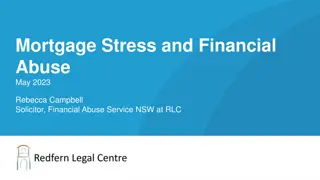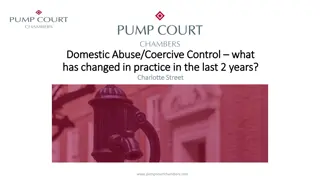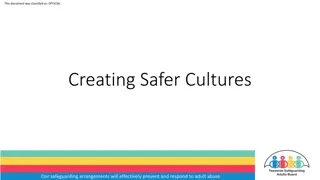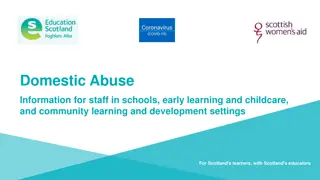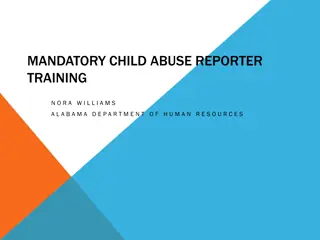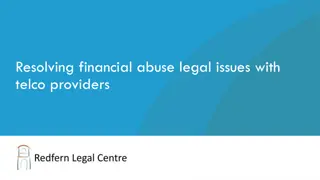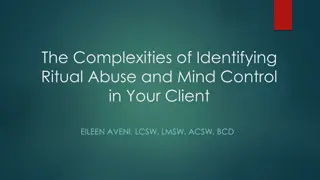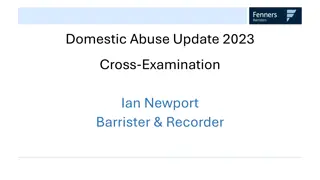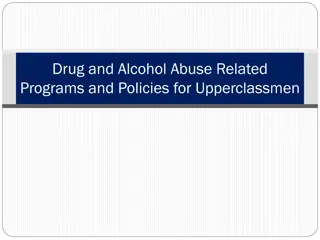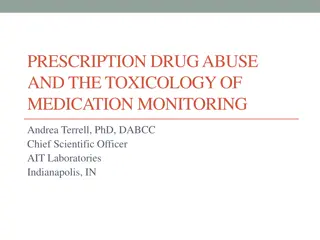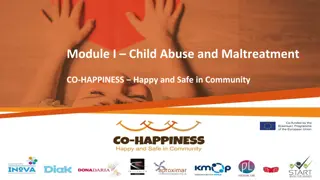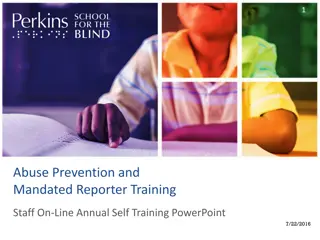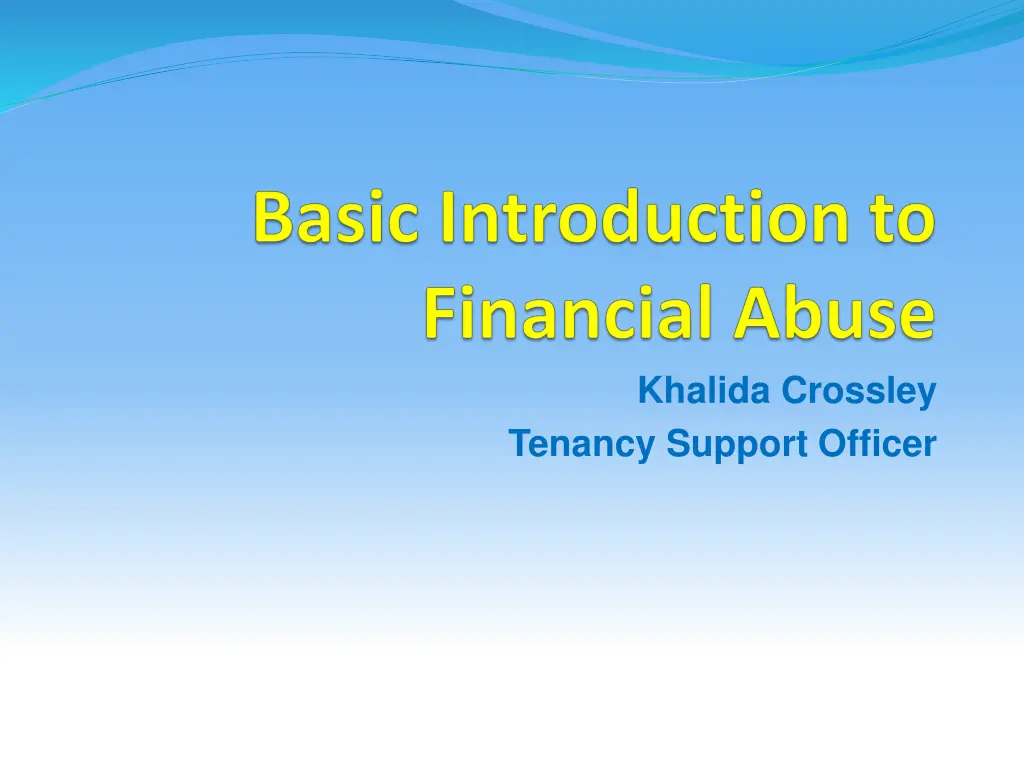
Understanding Financial Abuse and Its Types for Safeguarding
Learn about financial abuse, including its definition, types, signs, reporting barriers, and implications of mental capacity. Discover how to recognize, report, and prevent financial exploitation effectively.
Download Presentation

Please find below an Image/Link to download the presentation.
The content on the website is provided AS IS for your information and personal use only. It may not be sold, licensed, or shared on other websites without obtaining consent from the author. If you encounter any issues during the download, it is possible that the publisher has removed the file from their server.
You are allowed to download the files provided on this website for personal or commercial use, subject to the condition that they are used lawfully. All files are the property of their respective owners.
The content on the website is provided AS IS for your information and personal use only. It may not be sold, licensed, or shared on other websites without obtaining consent from the author.
E N D
Presentation Transcript
Khalida Crossley Tenancy Support Officer
Learning Outcomes Understand the different types of financial abuse Be able to recognise the signs of financial abuse Understand the barriers to reporting financial abuse Understand the implications of mental capacity and Making Safeguarding Personal Know how to report a concern
What is Financial Abuse? The unauthorised and improper use of funds, property or any resources belonging to another individual (DH / Home Office, 2000)
Types of Financial Abuse How many can you identify?
Types of Financial Abuse o Theft, fraud and exploitation o Pressure in connection with wills, property, inheritance or financial transactions o Misuse or misappropriation of property, assets, possessions, savings, capital or benefits o Theft i.e. money or possessions stolen, borrowed or withheld without permission
Types of Financial Abuse o Wrongfully controlling access to money or benefits o Preventing someone buying goods, services or leisure activities o Money being absorbed into a care home or household budget without the person s consent o Being deliberately overcharged for goods or services, or being asked to part with money under false pretenses
Types of Financial Abuse o Deliberately overcharged for goods or services, or being asked to part with money under false pretenses o Not providing the care (1 to 1 and shared hours) but charging the client o Carrying out unnecessary work and / or overcharging o Postal, telephone and internet scams where the person has interacted with someone and has lost money.
Types of Financial Abuse oUnlicensed money lending (loan sharks) i.e. being offered a loan on very bad terms oStaff or volunteers borrowing money, or accepting gifts or money from clients oMisuse of a person s assets by professionals oAltering ownership of property without consent.
Types of Financial Abuse o Exerting undue influence to give away assets. o Putting undue pressure on the person to accept lower-cost / lower quality services in order to preserve more financial resources to be passed to beneficiaries on death o Misuse of formal arrangement for finances: DWP Appointee, Lasting Power of Attorney and Court of Protection Deputy o Unauthorised use of a store reward card o Non-payment of personal allowance to a service user in a residential Home (to buy toiletries, pay for podiatrist or hairdresser)
Types of Financial Abuse o Misuse of bank debit card or post office card o Non-payment of social care fees How many did you identify?
Prevalence In Rochdale: 220 safeguarding referrals related to financial abuse as at least part of the abuse along with other categories. Of these 115 were for only financial abuse out of a total of 702 (2017-2018 data). They are often the hardest cases to prove.
Indicators/signs of Financial Abuse How many can you identify?
What are the indicators? o Unexplained withdrawals from a person s bank account o Cheque withdrawals to unknown businesses / persons o An unexplained shortage of money, despite an adequate income or immediately following benefit day o Unpaid or a sudden inability to pay bills o Payment of client contribution suddenly stops
What are the indicators? o Disparity between assets and satisfactory living conditions. o The person lacks belongings or services which they can clearly afford. o Reluctance on the part of family, friends or the person controlling funds to pay for replacement clothes or furniture. o Items purchased which are not appropriate for the person
What are the indicators? o Home improvements or repairs that are out of character with the person s lifestyle o Loans or credit being taken out by a person in circumstances that give cause for concern, such as the age of the person taking out the loan and the alleged reason for the loan o Pressure by family members and other people to sign over assets or alter wills o Borrowing money or items
Barriers to reporting A survey conducted in Rochdale in August-September 2017 eliciting the views of the public revealed that: 57% of members of the public were confident that they would recognise financial abuse 66% would be confident in reporting financial abuse Over 54% said they would be unwilling to report suspicions in case they were wrong
Barriers to reporting? Factors which would make it more likely for concerns to be reported included: Knowing where to report Being a relative/friend of the victim A telephone helpline An email address that could be used to report Being able to stay anonymous Understanding what would happen as a result Another common barrier is the fear of someone finding out you ve made a report
What can we do about it Ideas?
What can we do about it Be vigilant Raise awareness education Professional curiosity ask Community involvement looking out for neighbours REPORT!
Support for those who lack capacity to manage their money DWP Appointee An appointee is a person who has been chosen by the Department of Work and Pensions (DWP) to receive and manage welfare benefits on behalf of someone. A family member or a friend can act as an appointee. The local authority can act too there is an annual charge for this service
Support for those who lack capacity to manage their money Lasting Power of Attorney (LPA) An LPA is a legal document (created by the Mental Capacity Act 2005) that enables any individual over the age of 18 and who has mental capacity (the donor) to choose another individual or individuals (called attorney/s) to make decisions on their behalf. There are two types of LPA: A property and financial affairs LPA A health and welfare LPA
Whats important Joint working involve the right people Sharing information Record keeping document who you ve told and when Keep people safe ensure their needs are met (e.g. a person paying a loan shark and consequently can t afford to put the heating on) If in doubt involve safeguarding
Banking Protocol The Banking Protocol is an initiative between the police, banking institutions & Trading Standards. Its aims is to identify vulnerable victims who are in being defrauded of funds from their bank accounts and to intervene to prevent these crimes. Victims, particularly elderly and other vulnerable people, are targeted for a range of fraud offences. These crimes often involve the perpetrator encouraging the victim to visit their bank or post office in person and withdraw or transfer cash. Often the perpetrator will accompany the victim in order to make the cash withdrawal or transfer. If bank staff suspect a person is being coerced or the transaction is as a result of fraud, the transaction is highlighted and the Police are contacted. The Protocol is designed to provide a standardised method for how these concerns are dealt with and reported to police.
Impact of Financial Abuse o Depression / anxiety / stress o Distress o Anger o Embarrassment / loss of self-esteem o Self-blame decline in mental health o Denial / fear o Betrayal o Loss of confidence to live independently o Deterioration in physical health (leading to premature death) o Social isolation o More vulnerable to further exploitation o Inability to replace lost savings due to lack of earning potential o Risk of suicide
How to report Contact Adult Care Office hours 0300 303 8886 Out of office hours 0300 303 8875. Email - AdultPreventionTeam@rochdale.gov.uk If you think an adult is in immediate danger contact the police on 999
Thank you for taking part! We will email a link to the evaluation form. Once completed, we will send you your certificate of attendance.

